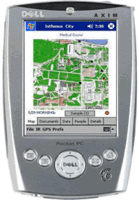Paper-based Local Games
Through a MacArthur grant by Squire, Steinkuehler, Hayes, and Shaffer, I've been hired to help out with the Greenbush AR Game, the Star Schools Games Project, and the design and creation of a GLS (Games Learning and Society) Area in the Teacher Education Building.
One of the requirements of the Star Schools grant, I understand, is to create a paper-based game as a "control" game. As I was considering how to make such a game, I was led to the following thoughts on games, in general.
With this in mind, I think we should consider forgetting to try to make the paper-based game content-specific, and instead make it concept-specific. After all, learning about E. coli on a particular beach is not the ultimate idea behind any of these games. Instead, what we're trying to teach is math and reading, and maybe a bit of scientific thinking, right?
We can do that with a variation of flash cards -- and teachers have been doing that. I think this might be a better paper-based option that gets closer to the heart of what we're actually proposing -- that place-based games are richer.
So, tell me where my thinking here is off-base. Am I missing something? Or are we trying to do something much more through the paper game than we need to / want to?
One of the requirements of the Star Schools grant, I understand, is to create a paper-based game as a "control" game. As I was considering how to make such a game, I was led to the following thoughts on games, in general.
- Re-playability: None of our tech-based games are really re-playable. They aren't designed to be. The philosophy that I think is behind this -- subconsciously, or unconsciously -- is from a curriculum mindset. We design a curriculum for kids to "go through" once. Then, next year, a new set of kids go through it. To contrast, the best games are infinitely re-playable. Imagine playing tic-tac-toe only once. You barely get the rules of the game and it's over. There is no "discovery and mastery" of the rules in a game that is played only once, unless it is heavily based on a well-known genre of games -- in which case it is more of a single variation of that game than its own game. And this is fine, if we want to go for that, but then the content of this particulat game is backgrounded.
- Element of chance: If the game is too specifically directed, it's less of a game and more of a tour or a puzzle (maybe not a puzzle). The connect-the-dots option of specifying a path to take cannot be the best option, but I'm not sure of other options that would assure that the content was covered as well -- especially given the time constraints of a place-based game. This is a tough issue.
With this in mind, I think we should consider forgetting to try to make the paper-based game content-specific, and instead make it concept-specific. After all, learning about E. coli on a particular beach is not the ultimate idea behind any of these games. Instead, what we're trying to teach is math and reading, and maybe a bit of scientific thinking, right?
We can do that with a variation of flash cards -- and teachers have been doing that. I think this might be a better paper-based option that gets closer to the heart of what we're actually proposing -- that place-based games are richer.
So, tell me where my thinking here is off-base. Am I missing something? Or are we trying to do something much more through the paper game than we need to / want to?

1 Comments:
As I know nothing about the card game, my comment is just a random thought. If this card game is "place-indifferent", does that mean that it could just as easily be played while sitting around a table in my living room? Seems to me that in order for a game to be categorized as "augmented reality" the location must be a part of the gamespace in such a manner that it interacts with the players (or vice versa). This doesn't mean that the game must always be tied to one physical location - it can still be portable, but there must be some notion of interaction between the player and the physical space that contributes meaningfully to the overall play experience.
Post a Comment
<< Home